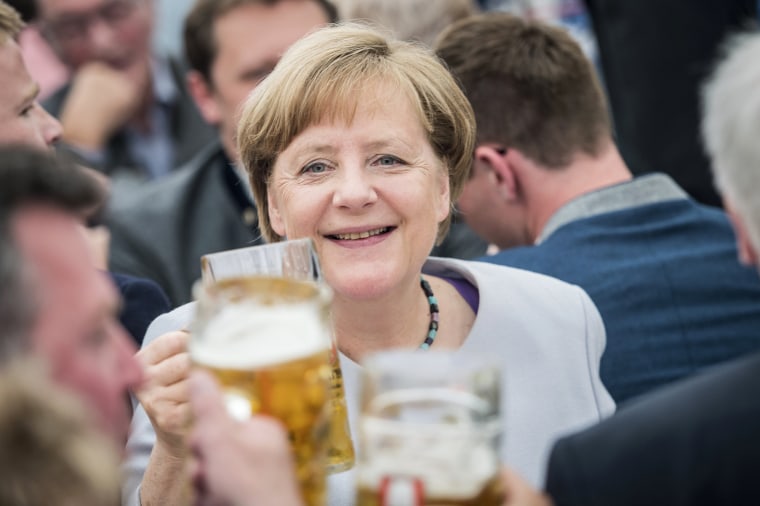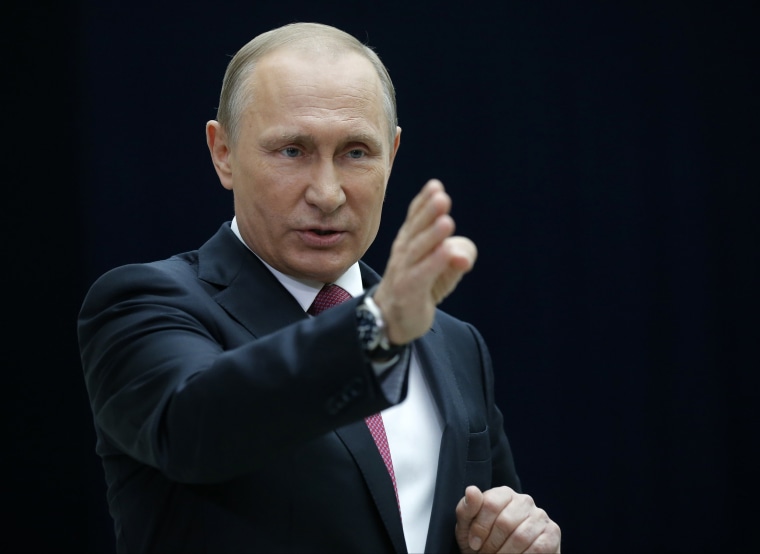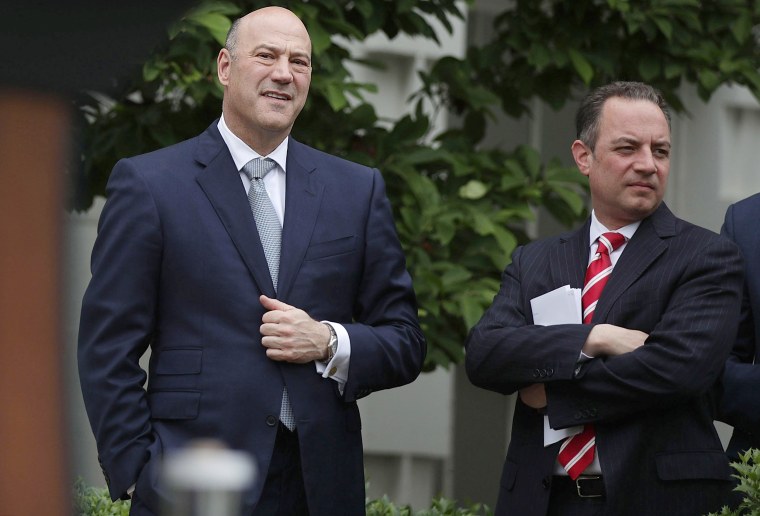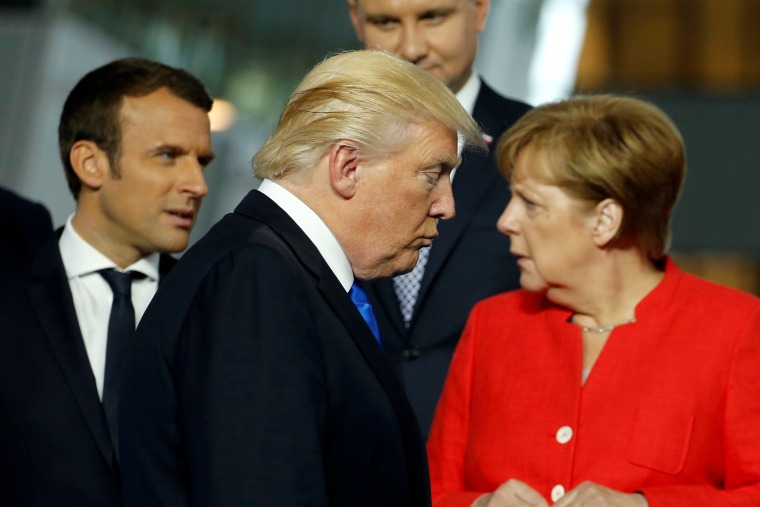WASHINGTON — President Donald Trump's second foray on the world stage will include navigating a much-anticipated meeting with Russian President Vladimir Putin and a potentially chilly reception from European leaders over his recent decision to withdraw from the Paris Climate Accord.
The stakes for Trump are especially high as he travels to the G20 Summit in Hamburg, Germany, beginning Friday to discuss critical issues of counter-terrorism, the civil war in Syria, and trade, among other topics, with his European counterparts. In his meeting with Putin, Trump will have to work to confront and deter Russia, but also find ways to work together on issues like Syria and combating ISIS, experts said.
And he must do this mindful of the increased scrutiny over his administration's relationship with Moscow and an FBI investigation into his campaign's ties to Russia.
Meanwhile, European leaders such as German Chancellor Angela Merkel, who in May said the U.S. could no longer be relied on as an ally, are prepped for tough talks on trade and climate change.
"The G20 agenda is set for some uncomfortable conversations," Charles Kupchan, a Council on Foreign Relations senior fellow, told NBC News. "It will be dominated by climate change, by free trade, by immigration, and these are issues where Trump is — more or less — alone."
Watch Germany's Merkel
"All eyes are on Merkel," Sudha David-Wilp of the German Marshall Fund said, pointing out that the German leader has "not been shy" recently about setting the tone for the upcoming summit.
In a speech to parliament, Merkel predicted that conversations at the G20 “will not be easy talks" and though she did not name Trump, her remarks were clearly directed at the president. She defended efforts on climate change and pushed back against the kind of isolationism sometimes promoted by Trump, who recently proclaimed he was the leader of "Pittsburgh, not Paris."
"Anyone who believes the problems of the world can be solved with isolationism and protectionism is making a big mistake," Merkel said.

The White House maintains the U.S. relationship with Germany is "as strong as ever." National Security Advisor H.R. McMaster told reporters last week that "of course there are going to be differences in relations with any country. And we’ll talk frankly about those differences. The president enjoys those conversations."
But the way Merkel, as the host of the G20, receives Trump will be telling.
"The top line will be: Is Trump — as he was during his first trip to Europe — the odd man out," said Kupchan, of the Council on Foreign Relations. "The party crasher. The person who kept himself against the mainstream. Or is he able to maneuver himself back into the good graces of his fellow leaders."
Nice to see you, Vlad
Trump is also set to meet Putin face to face in Germany on Friday, the White House has confirmed.
But after months of investigations into alleged Russian meddling in the 2016 election, it’s unclear whether Trump will broach the issue with his Kremlin counterpart.
"I expect an Olympian level of macho posturing between these two leaders, who both understand the importance of symbolism and the perception of being tough," said Derek Cholett, former assistant secretary of defense for international security affairs under President Barack Obama.
The question, he said, will be "what Putin asks for and what he offers in return."
Issues likely to be discussed include Ukraine, Syria, ISIS and alleged Russian meddling in Europe and the United States.
“Nobody wants a major-power war, right?” McMaster said. “And so what is it that we have to put in place to be able to deter conflict?"

Trump has repeatedly called allegations of collusion with Russia "fake news" pushed by the media and Democrats.
But his decision to head to Poland first could assuage onlookers waiting to see if he follows through on promises for a warmer relationship with Moscow. The Poland stop signals that, despite Trump's stated desire to better ties with Russia, the president is following a similar line as his predecessors and reaffirming the U.S. commitment to NATO and Europe.
That's exactly what allies like Poland want.
"As far as Russia is concerned, what’s important for us is NATO deterrence," Polish Ambassador Piotr Wilczek told a small gathering of reporters last week.
RELATED: Watch Trump's 2013 MSNBC interview on Putin, Russia
However, when Trump spoke in Brussels at NATO headquarters last month during his first trip abroad, he did not directly affirm support for the Article 5 provision of mutual defense of NATO allies, prompting skepticism and concern from NATO members.
"We’d like to hear that [affirmation] every day from the president of the United States and actually from leaders of all other NATO countries," Wilczek said.
What's up with trade
Trump’s refrain of "jobs, jobs, jobs" has been a cornerstone of his presidency — and his constant quest for a good deal will be on display in Europe.
The goal, said Gary Cohn, director of the National Economic Council, "is to work with our partners to jumpstart the world economy” which has been "too weak for far too long."
While Trump and key figures in the West Wing, like Steve Bannon, have pushed for a protectionist and nationalistic mindset on trade, there have been few trade threats the administration has made good on so far.

“On trade, no less than on alliances, 'America First' does not mean America alone," Cohn emphasized.
But Germany is bracing for the possibility of a "contentious time" with the U.S. on trade, said David-Wilp of the German Marshall Fund, specifically on the possibility of steel tariffs. Trump and Merkel discussed relations between the two countries over the weekend ahead of the summit, according to the White House.
Post-Paris climate agreement
When Trump pulled out of the Paris Climate Accord last month, his supporters hailed it as a victory while allies hung their heads.
But advisers said that he remains open to doing some kind of agreement on climate, even though he publicly said Paris was a bad deal for the U.S.
"He cares very much about the climate and environment, but he has to enter into a deal that’s fair for the American worker," Cohn said, adding that the president is “open to re-engaging on this or a new deal if it makes sense for the American people."
In a speech prior to the G20, Merkel said she would wage the climate-change battle with or without the United States. "We cannot wait until every last person on earth has been convinced of the scientific proof," she said in remarks to parliament.
White House advisers have been unable to articulate whether the president believes in climate change, which he has previously expressed skepticism about.
"The Paris agreement is irreversible and non-negotiable," Merkel said, promising "to carry out the negotiations at the G20 Summit so that they can serve the Paris climate agreement."
Kupchan said Merkel may be "more inclined to look to Beijing than Washington for help" on the issue.
But Daniel Twining, head of the German Marshall Fund of the United States' Asia Program, urged America's European allies to "avoid falling into the trap of pivoting away from America for tactical reasons related to the current occupant of the White House and pivoting towards China in a way that really undercuts Europe's most basic values and interests."

